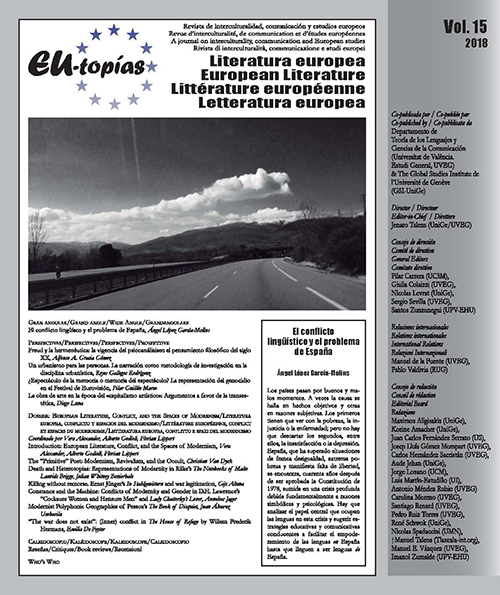Spectacle of Memory or Memory of the Spectacle?
DOI:
https://doi.org/10.7203/eutopias.0.18574Keywords:
Spectacle, genocide, Crimea, Eurovision Song Contest Abstract
Abstract
The Eurovision Song Contest has become, especially in recent editions, a space where the participating States have contributed with music performances related to causes of social justice, including the remembrance of the trauma of expulsion and ethnic cleansing in the European past. In the 2016 edition the winning act about the deportation of the Crimean Tartars during the Second World War has opened the debate about the political implications of the contest. Through the analysis of the lyrics and live performance of the song 1944 we shall point to the political discourse present in the song and we shall try to establish whether the spectacle can be regarded as a space capable of promoting a debate about memory or whether, on the contrary, the representation of the trauma of the genocide in the spectacle only contributes to the spectacularization of the tragedy.
 Downloads
Downloads
 References
References
Anttonen, Pertti J. (1996), “Introduction: Tradition and Political Identity”. En Pertti J. Anttonen (ed), Making Europe in Nordic Contexts, NIF Publications, Turku, pp. 7-40.
Baker, Catherine (2008), “Wild Dances and Dying Wolves: Simulation, Essencialization, and Nacional Identity at the Eurovision Song Contest”, Popular Communication: The International Journal of Media and Culture, 6 (3), pp. 173-189.
Baudrillard, Jean (1978), Cultura y simulacro, Barcelona: Kairós.
Baudrillard, Jean (1994), Simulacra and simulation, Ann Arbor, University of Michigan Press.
Bolin, Göran (2006), “Visions of Europe: Cultural Technologies of Nation-States”, International Journal of Cultural Studies, 9 (2), pp. 189-206.
Buhari gulmez, Didem (2016), “Religion and Nation-Building in Crimea”, En Rico Isaacs y Abel Polese (eds.), Nation-Building and Identity in the Post-Soviet Space. New Tools and Approaches, London, Routledge, pp. 65-82.
Danero iglesias, Julien (2015), “Eurovision Song Contest and identity crisis in Moldova”, Nationalities Papers: The Journal of Nationalism and Ethnicity, 43 (2), pp. 233-247.
Dayan, Daniel y Katz, Elihu (1992), Media events, the live broadcasting of history, Cambridge, Harvard University Press.
Debord, Guy (1976), La sociedad del espectáculo, Madrid: Castellote.
Derderian, Ani (2011), “Characteristics of Armenian Folk Tales”, International Journal of Business and Social Science, 24 (2), pp. 74-82.
Ismayilov, Murad (2012), “State, Identity and the Politics of Music: Eurovision and Nation-Building in Azerbaijan”, Nationalities Papers, 40 (6): 833-851.
Jordan, Paul (2014), The Modern Fairy Tale: Nation Branding, National Identity and the Eurovision Song Contest in Estonia, Tartu: University of Tartu Press.
Legg ewie, Claus (2008), “A tour of the battleground: The seven circles of pan-European memory”, Social Research, 75(1), pp. 217-234.
Marković, Aleksandra (2013), Sounding stereotypes: Construction of place and reproduction of metaphors in the music of Goran Bregović. University of Amsterdam.
Naroditskaya, Inna (2002), “The sound of traditional mugham”, En Inna Naroditskaya, Song from the Land of Fire: Continuity and Change in Azerbaijanian Mugham, New York, Routledge, pp. 53-90.
Raykoff, Ivan (2007), “Camping on the borders of Europe”. En Ivan Raykoff and Robert Deam Tobin (eds.), A song for Europe. Popular music and politics in the Eurovision Song Contest, Hampshire, Ashgate, pp. 1-13.
Downloads
Published
How to Cite
-
Abstract227
-
PDF (Español)80
Issue
Section
License
![]()
The authors conserve the copyright. All content published in EU-topías. Journal of interculturality, Communication, and European Studies are subject to the license Creative Commons Attribution-NonCommercial-ShareAlike 4.0 license. The full text of the license can be found at <http://creativecommons.org/licenses/by-nc-sa/4.0>
They may be copied, used, disseminated, transmitted and publicly displayed, provided that:
- The authorship and original source of the publication is cited (journal, publisher and URL of the work).
- They are not used for commercial purposes.
- The existence and specifications of this license of use are mentioned.
It is the responsibility of the authors to obtain the necessary permissions for images that are subject to copyright.



